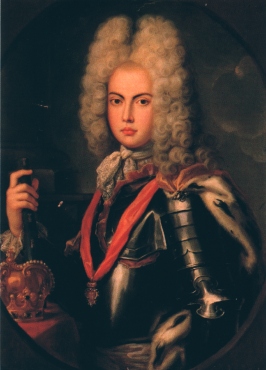<Back to Index>
- Mathematician Alexander Semenovich Kronrod, 1921
- Actress Sarah Bernhardt, 1844
- King of Portugal and the Algarves John V, 1689
PAGE SPONSOR

Fidelíssimus John V (Portuguese João V) the Magnanimous (Port. o Magnânimo) (October 22, 1689 – July 31, 1750), 24th (or 25th according to some historians) king of Portugal and the Algarves, was born John Francis Anthony of Braganza, in Portuguese João Francisco António de Bragança, in Lisbon and succeeded his father Peter II in December 1706, and was proclaimed on January 1, 1707.
His father had long suffered from lack of heirs, and the relatively new royal house of Braganza was indeed on the verge of going extinct — the king had only one surviving (though sickly) daughter from his first marriage, John's half-sister Isabel Luisa, Princess of Beira. However, after the death of his first wife, the old king remarried, and John's mother was able to produce eight more children, including John himself. When John was born, he became Prince of Brazil as the king's heir-apparent, as well as the 13th Duke of Braganza.
Since his father had been elderly, John succeeded at quite a young age, only 17. One of his first kingly acts was to intimate his adherence to the Grand Alliance, which his father had joined in 1703. Accordingly, his general Marquês das Minas, along with Lord Galway, advanced into Castile, even taking Madrid, but later sustained the defeat of Almanza (April 14).
In October 1708 he married his maternal first cousin Archduchess & Princess Imperial Maria Anna of Austria, Princess Royal of Hungary and Bohemia (1683 – 1754), daughter of Leopold I, Holy Roman Emperor, and his third wife, Eleonore Magdalena of the Palatinate - Neuburg, thus strengthening the alliance with Austria.
The series of unsuccessful campaigns that ensued, ultimately terminated in a favourable peace with France in 1713 and with Spain in 1715.
His long reign was characterized by a strengthening of the king's power due to the incomes the crown earned by exploring the newly found gold and diamond mines in Brazil. A fifth of each ton extracted from these mines were crown property, the rest being divided among claim owners, contractors and public administrators. This sudden wealth enabled the king to rule without summoning the Cortes, thus becoming an absolute monarch. Due to his centralistic ruling, he had to endure the political opposition of several noble families and influential clergymen. In what most probably was an effort to tame the upper nobility, John V built his own Versailles, the grand Royal Palace of Mafra.
John V was the greatest patron of the arts in the Europe of his time. The Portuguese Empire was then extremely rich – Portugal collected more gold from the newly found Brazilian mines over a few decades than Spain took from the remaining of Central and South America over 400 years; there were also the very productive diamond and precious gemstone mines that kept the royal coffers full. With this endless supply of money he bought some of the greatest art collections that were available at the time – at a point, in one single occasion, over 80 paintings by great Italian masters were taken in to the royal palace in Lisbon. The music library, already the greatest in the world, was enlarged as was the royal library and other libraries in the country. The King insisted his ambassadors would keep him informed about the state of the arts in foreign countries and would buy only the best from the most reputable artists of the time. Unfortunately most of the great collections amassed by John V and the Portuguese aristocracy, along with the vast majority of the city of Lisbon were suddenly destroyed by the great earthquake of 1755 followed by a tsunami and fire.
John V used much of the crown's treasure to develop Portugal's economy (creating new manufactures all over the country), to patronise the arts and intellectuals (Royal academies were founded), and to advance his country's prestige among its European neighbors after the Crisis of Succession and short lived union with Spain (1640). His foreign policy followed two simple and unaltered rules: political neutrality in European conflicts and constant negotiations with the Vatican in order to be recognised as a lawful monarch. To this end, he spent heavily in bribes to church officials and embassies to the Pope.
His negotiations with the Vatican gained the recognition of Portugal as a lawful sovereign country by Pope Benedict XIV in 1748 and the title "Most Faithful King" bestowed upon him and his successors by a bull. Six years before receiving this title, John suffered a stroke, which left him partially paralysed and unable to intervene in political affairs. His last years of life were dedicated to religious activities. His early economic measures, which were unpopular among the upper nobility, became ineffective, and public affairs were so dependent on John's rule that they became almost inoperative. John V died on July 31, 1750 in Lisbon, and was succeeded by his son Prince Joseph.